Doctor Who and the Adventure of the Rose-tinted Glasses
Doctor Who has become a bit divisive recently. Stephen Moffat has been tearing many away from their childhood favourite through bad plotting with ridiculous premises, frantic episode pacing and bad characterisation. Or has he?
The show is still about a British (for now) casted alien man rushing around saving the day from monsters through wit and a sonic screwdriver inside of 42 minutes. Has the show changed or have the fans changed? Is Doctor Who a show best viewed by the young when it comes to its non-hardcore fans? Admittedly many hardcore fans have also been put off and my wonderings are ignoring fans of the original series and their more generally aimed gripes at New Who. But since 2005 and the following Tennant era (the Russell T Davies or RTD era as a whole) has the show really changed that much?
When weighing everything up and against each other about the two eras I find them to be relatively equal in quality and basically identical in style and approach. It is important before you read this with whatever impassioned perspective you have of your own, Doctor Who is a show with different eras with different tone, it is built into the concept of the show. As such you are bound to like one era more than another and even hate one if it doesn’t go with your preferred sensibilities for the show, but Doctor Who is a programme designed to be able to tell any and all stories. That means it will sometimes tell stories you don’t like and in a way you don’t like. Though I do truly value both Moffat and RTD eras of Doctor Who roughly equal, so nobody go calling me a fanboy of one era over the other.
One of the main complaints about the Stephen Moffat era (Matt Smith and onwards) is the use of complex overarching plots (which I’ll get to). Though there are plenty of individual stories included also. If you break down the individual episodes (including some of the arcs) how does Moffat’s era compare to RTD’s? I’d argue that RTD’s era was a constant source of up and down quality from great episodes to the truly awful, whilst Moffat’s era is full of simply ‘good’ episodes consistently with some spots of disappointment.
In the 2005 series there are many low points, such as; the uneventful Unquiet Dead with its all too convenient solution of there being a psychic girl on hand, and Boom Town an episode that is clearly only in existence due to budget and filming time constraints but manages to not rise above this and turn into pure filler. Even the good episodes such as the two-parters of Aliens of London/World War Three that was tinged with the awfulness of farting aliens, and Bad Wolf/The Parting of the Ways with its deus ex machina that goes too far even for Doctor Who. Rose opened a hatch on the TARDIS console and became a God? Really?! 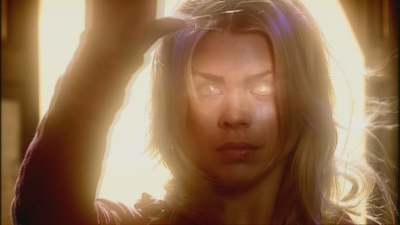 Many would say the strongest story of this series was The Empty Child/The Doctor Dances and you’ll find the much derided Stephen Moffat wrote that one. RTD’s second series and Tennant’s first continued in this vein of rapidly rising and falling quality. There are classics in there like The Impossible Planet/The Satan Pit, The Idiot’s Lantern and The Girl in the Fireplace (another Moffat) but there is also a quagmire of awfulness here too; Fear Her has all the same problems of the previous series’ Boom Town, there is also the sickly cheesefest that is School Reunion and are there really any fans of Love and Monsters? I can’t imagine a worse episode of Doctor Who, Colin Baker led stuff included.
Many would say the strongest story of this series was The Empty Child/The Doctor Dances and you’ll find the much derided Stephen Moffat wrote that one. RTD’s second series and Tennant’s first continued in this vein of rapidly rising and falling quality. There are classics in there like The Impossible Planet/The Satan Pit, The Idiot’s Lantern and The Girl in the Fireplace (another Moffat) but there is also a quagmire of awfulness here too; Fear Her has all the same problems of the previous series’ Boom Town, there is also the sickly cheesefest that is School Reunion and are there really any fans of Love and Monsters? I can’t imagine a worse episode of Doctor Who, Colin Baker led stuff included.
Even the other good stuff like the Cyberman two parter and Tooth and Claw have their problems. Rise of the Cybermen/The Age of Steel is plagued by appalling acting from its guest stars and the deus ex machina of Tooth and Claw; that two guys thought a Werewolf might exist and might also try to kill the Queen so they built a house/trap for it that is based on its supposed and assumed weakness of ‘too much moonlight’. The concept is just unfathomable. And the series finale has the Cybermen fight the Daleks for no more reason than ‘why not?’
This trend of varying episode quality continues into RTD’s third series. There is the great stuff in Smith and Jones, Human Nature/The Family of Blood, Blink (a big favourite and also a Moffat episode) and the three part finale is probably the strongest of RTD’s era. But then there is also another cheesefest in the form of Gridlock that cameos a classic monster in the Macra in a way that literally doesn’t affect the plot at all and has a bizarre resolution where there isn’t enough power to save the day…except the Doctor flips a couple of switches and then there is. Daleks in Manhattan/Evolution of the Daleks features bad American accents, the comedic looking human-Dalek and the awful resolution that revolves around DNA being transferred through a lightning bolt. Then there is the Christmas Special Voyage of the Damned where awful acting, a stupid premise and sheer over-the-topness compounds to make something almost as unwatchable as Love and Monsters.
RTD’s fourth series is stronger as a whole than any other except for its finale that is again over the top and bizarrely navel gazing. Did he have to spin Torchwood and The Sarah Jane Adventures into it? As well as every guest character from the previous four years that he has written? It turns into a glorified victory lap. There are also disappointments such as The Sontaran Stratagem/The Poison Sky and The Doctor’s Daughter with the former’s resolution making no sense (why would the device only burn the gas in the sky? Not everywhere? Wouldn’t it use up the Earth’s oxygen supply?) and the overall badness of an out-of-date-Trek-tone in the latter. Then we get another truly bad Christmas special in the form of The Next Doctor, even at Christmas is anyone really able to accept hammy acting and a giant cyber-punk Cyberman?
Then in the year of the specials we had the competent Planet of the Dead and the potentially classic Waters of Mars, but then there was RTD’s and Tenant’s final story The End of Time. I understand it was all a bit of a special moment for the show, but did it need to be a two-parter with a combined length of two hours and fifteen minutes? Especially for a story this limited? Whenever someone complains about the ending(s) of The Return of the King I think that they can’t have seen The End of Time, which again features many guest characters from the era and turns into another big glorified victory lap. As a whole RTD’s era had really awful stuff but the great stuff redeemed it by miles and that is in spite of the muggy cinematography that was sometimes akin to Eastenders and the approach to directing actors to be always hamming it up beyond belief, which seems to have been a deliberate stylisation.
So how does Moffat’s era compare on an episode-by-episode basis? In his first series there are classics like The Eleventh Hour, Amy’s Choice (a great character piece all around) and Vincent and the Doctor. Vampires of Venice can be quite divisive due to its comedic tone but it certainly doesn’t get anywhere near to the cheese factor of many RTD era stories. The Pandorica Opens/The Big Bang also have deux ex machina problems but the story as a whole sits perfectly with the ‘fairytale’ approach of this series. The Hungry Earth/Cold Blood is a bit flat and pointless but still very competent. The message here is in Moffat’s first series there are no truly awful episodes.
The following Christmas Special A Christmas Carol is bound to be divisive and my personal like of the episode may seem hypocritical given my hate of The Next Doctor, however flying fish affected by singing is established early on in the episode’s internal logic rather than a giant Cyberman appearing in the last ten minutes just because. The acting is all solid and the singing exceptional. Frankly it is just genuinely moving and again the cheese never reaches RTD era heights. 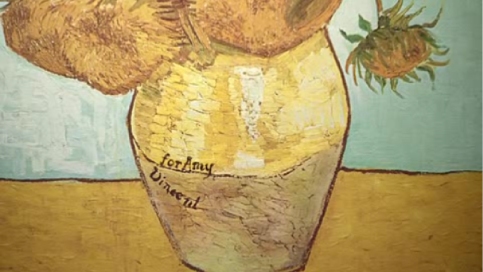 Moffat’s second series is certainly weaker than his first and he does push the fairytale logic further than it deserves, however there are classics nestled in there like The Impossible Astronaut/Day of the Moon (which is only made weaker by episodes that follow the plot up), The Doctor’s Wife, The Girl Who Waited and The God Complex. I would say A Good Man Goes to War is the first truly bad Moffat era episode and in that I would say it was alone. I personally love Let’s Kill Hitler for Matt Smith’s performance in the story, however I have to admit that it and Wedding of River Song come with extreme plot hole and fairy tale logic gripes. I wouldn’t say they are bad however, they are well acted and shot and generally give suitable pay offs to the series’ arcs. One actually bad episode doesn’t stop this era still being way ahead of RTD’s on an episode-by-episode basis.
Moffat’s second series is certainly weaker than his first and he does push the fairytale logic further than it deserves, however there are classics nestled in there like The Impossible Astronaut/Day of the Moon (which is only made weaker by episodes that follow the plot up), The Doctor’s Wife, The Girl Who Waited and The God Complex. I would say A Good Man Goes to War is the first truly bad Moffat era episode and in that I would say it was alone. I personally love Let’s Kill Hitler for Matt Smith’s performance in the story, however I have to admit that it and Wedding of River Song come with extreme plot hole and fairy tale logic gripes. I wouldn’t say they are bad however, they are well acted and shot and generally give suitable pay offs to the series’ arcs. One actually bad episode doesn’t stop this era still being way ahead of RTD’s on an episode-by-episode basis.
The following Christmas Special The Doctor, the Widow and the Wardrobe is by no means amazing, but it remains fairly low key which has ended the irritation of each Christmas Special trying to out do the previous one, and again it is genuinely quite moving.
Then we have Moffat’s most problematic series. The decision to make every episode a film-like-event with no two parters was clearly a bad move. However was it really his choice? I am not usually one for conspiracy theories but given that Moffat clearly prefers telling stories with an longer episode length (Sherlock) and the prevalence of his Doctor Who work being in two-parters it is more than likely the ‘no-two-parters’ rule was from the BBC. They probably saw the criticisms over the complexity of the previous series and reacted in a rather knee-jerk fashion. Though in fairness if this is the case Moffat clearly didn’t rise to the challenge very well. The number of classics in this series is virtually nonexistent, I’d say the only stories to qualify are A Town Called Mercy and perhaps The Crimson Horror (the episode is ridiculous but perfect for what it is). There are also several awful stories in the form of Dinosaurs on a Spaceship, Rings of Akhaten and Nightmare in Silver, but again in terms of an episode-by-episode basis Moffat is still ahead. The problem with this series was that every episode apart from those I already mentioned were just competent but also disappointing with groan-worthy resolutions (the Sonic screwdriver has a function to blow up a submarine now does it?) and very rushed pacing.
Generally speaking most of the stories spend about twenty minutes of character based shenanigans, then ten minutes of actual adventure and then the Doctor immediately saves the day and then more meandering shenanigans until the story ends. But plenty of shows have their lower points (as none of this made Doctor Who truly bad for a year) and this doesn’t mean you should stop watching it or saying it has been ruined completely.
The following 50th Anniversary special The Day of the Doctor was a solid enough episode with enough basis in the current storyline as well as appropriate levels of fanfare and fan service, certainly much more appropriate levels than The End of Time. However then there was the following Matt Smith finale that is The Time of the Doctor. Overall it was rushed and compressed and a complete hive of disappointment that, apart from the final sequence, made a mess of tying up the lose ends of the Silence arc as well as the horrible resolution of The Doctor defeating the Daleks with his explosive regeneration energy. However, would less have been compressed into this one episode if Moffat hadn’t (as I theorise anyway) been told ‘no-two-parters’ and to keep the arc-heaviness to a minimum? This could have been a more measured character piece of an elderly Doctor baby-sitting a besieged planet to his dying breath if Moffat had time to slowly give away the details in the proceeding sixteen episodes, however this is still just a conspiracy of mine.
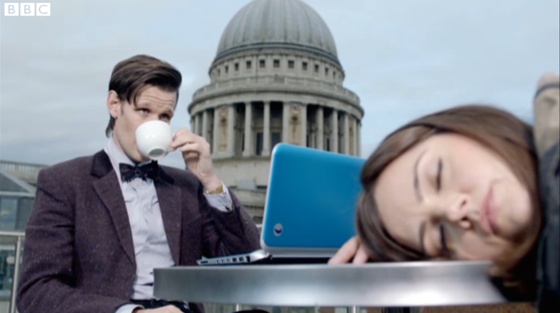
In this episode he literally just has to use a laptop to win immediately after half an hour of set up.
Now we’re only four weeks (at time of writing) into Moffat’s fourth series and Peter Capaldi’s first. At this point there is the very competent Deep Breath which has great character moments and the reuses of previous motifs by Moffat sits better under re-watches and makes thematic sense. Also Into the Dalek is probably the best Dalek story since 2005’s Dalek. Robot of Sherwood with its pure cheese and stupid character decisions is probably one of the worst episodes for a few years however this one examples doesn’t mean this is the beginning of a trend. Last weekend we were delivered Listen that is bound to put off some fans but when broken down is ultimately a nice examination of the Doctor’s character as well as the most all-round creep fest from Moffat since 2007’s Blink. Is Clara having influence over the Doctor’s fears as a child a paradox? Not really as what she said to him was inspired by the Doctor’s actions in Day of the Doctor which in turn were caused by the Eleventh Doctor’s experiences since regenerating. Clara talked to him about his fears, she didn’t encourage him to travel around time and space or anything like that.
Either way, here we are. As a whole Moffat’s era has gotten worse recently but it isn’t likely to be entirely his fault and in terms of an episode-by-episode batting average he is still ahead of the RTD era on an episode-by-episode count. Yes, the fairytale logic has gone on too long and yes the Sonic Screwdriver is overpowered and the pacing was squiffy for a time, but is that instead a result of having a format where you have to established a new world, new rules, often new species and tell a complete story with ups and downs and small character moments all only inside of 42 two minutes? Again another criticism that can be levied at Moffat is his overuse of arc-heavy plots spanning the series. However RTD did that also, but instead of actual plots he just had characters ushering words and phrases like ‘Bad Wolf’ and ‘Torchwood’ rather than any actual arc building. Arguably the River Song plot was too complex to follow, however it isn’t really if you were paying attention. And if anyone says Doctor Who is a ‘children’s show’ that attitude clearly comes from a fairly patronising view of what children can and can’t understand. In fact I assumed all over the country parents were having to go to their child for explanations for the plots. Arc-heavy TV is commonplace and popular currently in the form of Breaking Bad, Game of Thrones and True Detective. Why is there a sudden dislike of this when it comes to Doctor Who? I understand the attitude that someone wants to be able to sit down and just watch Doctor Who and understand what is going on, but the show still has more standalone episodes than arc-heavy stuff as well as the fact that frankly the show should be tailored to the regular and dedicated fans.
Where the show does patronise children and adults alike is in the lack of real world commentary and allegories. RTD’s era had plenty of sharp commentary and satire on real world politics and philosophies, Stephen Moffat’s era has none at all essentially. The science fiction element is used to justify fairytale logic and ‘magical’ occurrences rather than exploring human nature. However, as a replacement his era has had a detailed examination of the Doctor and his self-created legend and the way he utilises said legend to instil fear in his enemies, as well as all the flaws and foibles that come with that whole strategy. Again, if you don’t like the portrayal of the Doctor as ‘Godlike’ and powerful this is not actually something Moffat established, instead it was RTD in his era with his many epic Doctor speeches and characters referring to him as an ‘angry God’. Moffat also made steps towards reducing the Doctor’s celebrity with him making an actual in-Universe effort to ‘step back into the shadows’. Admittedly Moffat’s approach to Doctor Who is limited and there is no reason why there can’t be both cynical examinations of the Doctor as well as great science fiction satire. In this area Moffat’s era certainly fails.
Moving on, I have yet to address the criticisms of characterisation in the era. It is safe to say Matt Smith was not as popular as David Tennant. In fact there was a knee-jerk reaction to his casting before and after his episodes had aired. Tennant’s Doctor was a young, dashing and heroic figure with romantic inclinations, he forced his moral outlook on others, he had a very particular costume, a series of catchphrases, he relied on his sonic screwdriver and impassioned speeches, many of which were about the worthiness of humanity and towards the end of his era he became a bit annoying and over the top and reliant on all this characteristics at the loss of nuance. Now anyone with any basic sense of character analysis will notice that extensive description perfectly applies to Matt Smith’s Doctor. They were essentially the same character but played by different actors.
As such it is safe to say the knee-jerk reaction to Matt Smith was based less in reason and more in a hate of anyone that isn’t David Tennant. Seriously, go find some comments on old articles about the casting of Matt Smith and see how many are based in the complain that he isn’t as pretty as David Tennant. Onto Peter Capaldi, there have been a few rumblings of discontent about the nature of his grumpy and ruthless Doctor and rather than just rely on the argument that is his like a Classic Series Doctor I shall just point out the underlying overall characteristics of a post-Time War Doctor.
The Doctor isn’t a nice man, he is a guy that travels in space in time knowing that he’ll always run into trouble and danger and still takes a companion (usually ones with no military or survival training). Their purpose (as implied and directly expressed by the show) is so he has someone to show off to and to have people that still ‘feel properly’ to keep him from turning evil or too utilitarian in his methods. He knows from experience that many of these companions will end up with their lives ruined or at least messed up to some degree and some of them will even die. He deliberately fosters their faith in him rather than a faith in himself. On top of that he chooses to interfere in the fates of these planets and peoples simply because it doesn’t agree with his own personal morals, and the reason he does it is pretty much because he enjoys the experience. He even refers to himself as ‘the highest authority’. He may be an alien genius with the intellectual and the sonic tool to solve any problem, but his companions have none of that yet he often forces them to never use firearms or deadly force to defend themselves. They essentially have to survive by relying on a level of thinking most human genius’ could never achieve, so in the end he just saves them again.
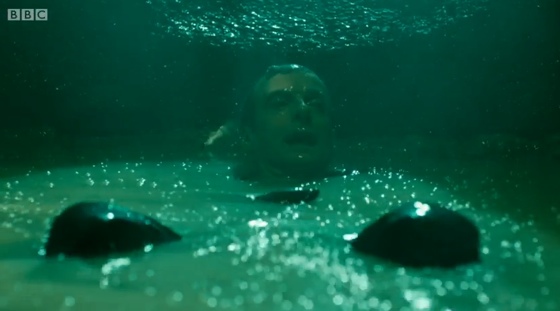
“He’s on the top layer if you want to say a few words, I don’t, because I’m not into that shit anymore. Not that I ever really was…”
At best the Doctor is an adrenaline junkie of a psychopath. Tennant and Smith’s Doctor’s implied these factors and showed them in various ways (again Moffat’s era is focused on this in episodes like Amy’s Choice, The Girl Who Waited and so on) whilst the Doctor essentially created an image of himself as a quirky nice guy, the easily achieved raged that allowed him to swiftly declare surrender or genocide at his enemies was always constant. Have you never noticed how the Doctor gets more upset by losing a companion than when he commits mass murder? He needs his companions to be stable and nice but has no long time problems with murder, not enough to stop living his lifestyle anyway. Peter Capaldi’s Doctor has all of these qualities too, he’s just being honest about it. He has no time for trying to pretend to be nice or decent for the sake of making his human companions feel safe. This approach is actually a refreshing one after six series of ‘boyfriendy’ Doctors.
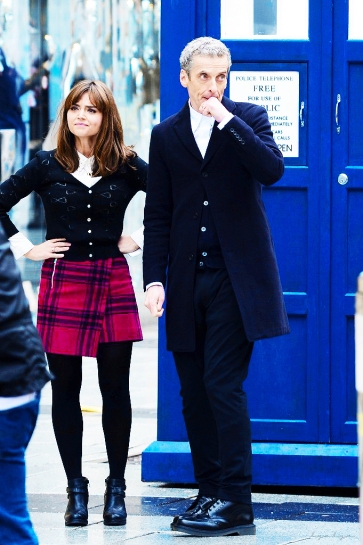
If you think about it he is being nicer by not giving them romantic expectations of him he’ll never fulfil.
How about the characterisation of everyone else in the Moffat era then? Amy Pond is fierce, loyal, obsessive, flirtatious, witty, impatient, often wise and ultimately kind and decent. She works well as the Doctor’s conscience. Rory Williams is also loyal but meek, fearful, unsure of himself but grows to be brave, more forward as well as being more consistently decent and moral than the Doctor and even Amy. Their motivations are clear and they’re a variation on the themes of the previous companions. River Song is another divisive figure in the series, and even if her stories are lacking her character is quirky, quick-witted, immoral and dangerous, more of an adrenaline junkie than the Doctor, also flirtatious but undercut all with a profound sense of sorrow, damage and loss. She’s a great character even if she isn’t used well at all times and we never truly see her travels with the Doctor, just how she came about and how she met him.
Many criticisms are levelled at the Doctor and River’s love story, especially that it seems they only got together because it was ‘destiny’ and for no other reason. This always bewilders me as an argument, because David Tennant and Matt Smith both had fantastic and thick chemistry with Alex Kingston in the respective roles of Doctor and River Song. It was very very clear they had a thing for each other and were well suited due to all their shared flaws and obsessions. 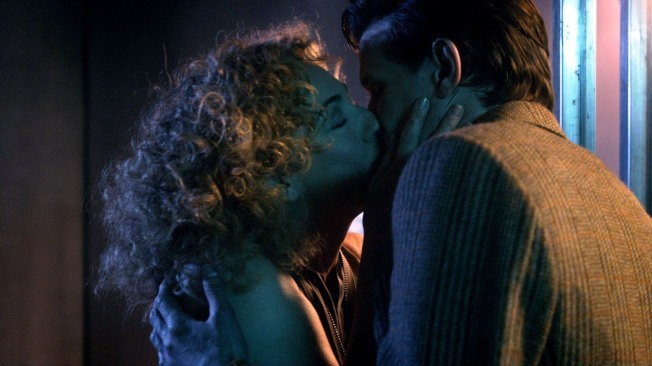 In terms of the ‘destiny’ criticism, imagine if you personally had amazing chemistry with someone and you were then told it works out well and you fall in love and get married, wouldn’t that encourage you further? Now some might argue the Doctor was never truly ‘in love’ with River as she was just a mystery for him to solve, but if that is the case that is even better. She was clearly in love with him and the Doctor can’t relate to anyone or even feelings in a healthy manner anymore, the fact he falls for someone because they’re a mystery is the exact sort of psychopathic reaction that makes perfect sense for his character! However it doesn’t take an idiot to see that Moffat overuses the ‘mystery woman’ plot arc too much, from Amy Pond’s odd home life to River and Clara with the new addition of this ‘Missy’ figure in Capaldi’s first series, this is clearly something he does too much.
In terms of the ‘destiny’ criticism, imagine if you personally had amazing chemistry with someone and you were then told it works out well and you fall in love and get married, wouldn’t that encourage you further? Now some might argue the Doctor was never truly ‘in love’ with River as she was just a mystery for him to solve, but if that is the case that is even better. She was clearly in love with him and the Doctor can’t relate to anyone or even feelings in a healthy manner anymore, the fact he falls for someone because they’re a mystery is the exact sort of psychopathic reaction that makes perfect sense for his character! However it doesn’t take an idiot to see that Moffat overuses the ‘mystery woman’ plot arc too much, from Amy Pond’s odd home life to River and Clara with the new addition of this ‘Missy’ figure in Capaldi’s first series, this is clearly something he does too much.
As such the third ‘mysterious woman’ arc results in a poorly defined character for Clara. However that being said it is seen that she is intended to be more shy and fearful, more responsible than other companions and more of a parent-like figure to those they meet, as well as the Doctor more recently. A lot of the flaws in her characterisation stem from the fact that Moffat writes her one way and then his writers in their own respective episodes write her another way. Neil Gaiman claimed the decision to change her from the Victorian Clara to the Modern and Original Clara was made relatively late. Most likely many of the episodes in Moffat’s third series were written with the more confidence and go-getting Victorian Clara in mind. This is also probably why Clara has improved as a character from Day of the Doctor onwards.
As such it is hard to say that Moffat’s era is especially badly characterised. Many level criticisms of sexism against his era for the way the female characters have stupid names like ‘The Girl who Waited’ and how River entirely revolves around the Doctor’s life as well as the fact all of the female companions are in love with The Doctor in some way. These are all fair criticisms. However a lot of these choices served a purpose, Amy’s love of the Doctor was really about her inability to be responsible and accept a simpler life with Rory that ultimately developed into a story of her realising The Doctor’s dangerous nature as well as her more imbedded deeper love for Rory. Whilst it is true River’s time on the show revolved around the Doctor it is implied (apart from during her prison sentence) that she has adventures of her own and it seems she does refuse to become a full fledged companion that stays aboard the TARDIS for more than one adventure at a time, she doesn’t just sit around waiting for the Doctor all the time.
Clara’s love for the Doctor is irritating, at first it was characterised as a twist that the Doctor had a very slight unrequited crush on her, but Moffat went back on this from Time of The Doctor onwards, however this at least did serve a purpose of giving Clara the shock to her system of having a blunt and cruel Doctor like Capaldi in which her relationship with him has changed and given her a more realistic outlook. So yeah, good characters that are sometimes used poorly. If we compare this to the favoured RTD era you’ll find it stands up well. Rose is a good character, there is no doubt about that, but she is also in love with the Doctor and her arc is about her love of him and how he relies on her to make her a better person. Yes, she has her home life separate from the Doctor but so did Amy, Rory and Clara. So any criticisms against them can be levied against her, especially as the Doctor even lets a human copy of himself go off with her. Her story ends up literally being about him and her getting together.
Martha Jones doesn’t have a character, she is nice I guess? Clever? Brave? But overall essentially bland, and this isn’t helped by Freema Agyeman’s pathetic acting in the role. Martha was written out as a companion because they were aware of this. Oh and she was also in love with the Doctor.
She is worse character than anyone Moffat wrote with an equally sexist plot line. RTD’s era however does have a strength in Donna Noble. She oozes character and plenty of flaws. She isn’t in love with the Doctor and she has great character development that shows a honest growth of a real human being, this all makes it extra tragic when he loses her memories of her travels with the Doctor. However the last we see of her is her getting married. So she lost her memory and it was tragic and everything but at least she got a man, eh?! Not at all sexist that…
As a whole I’d say the characterisation and plot arc and flaws with those in both RTD and Moffat eras are on par with each other. As a whole that is my message here actually. Both eras are on par with each other. RTD’s era was a roller coaster of shifting with bad quality acting and production values but with many stand out amazing episodes. Moffat’s era was consistently solid with much fewer awful episodes but with many disappointing ones but with better acting in general and much higher production values (I can’t really attribute the BBC giving the show more money to Moffat’s skill, but it is still a quality that is part of his era.) The characters are also on par as I pointed out above. Yes it is bad that Moffat’s era has no real Science Fiction commentary and allegories and for me this is the biggest weakness, however he did cut into the nature of the modern Doctor as a hero in more depth than before. RTD’s era did have better pacing and better use of time for character moments, however his overuse of cheesiness never achieves the genuinely moving heights of many Moffat stories, despite more frequent attempts to move people. When balancing this all out neither era is really ‘better’ in any noticeable way, they both have their underlying faults and strengths.
So beyond differences in how people just value certain faults and strengths against each other, why all the hate? Is it because many who were young during the series coming back in 2005 are now older and it just simply isn’t for them anymore? Or is it the fact that after nearly nine years, underneath all the surface differences, the show is the same? From the structure of each episode, how he goes about saving the day and the role of companions; everything is the same.
Are some people just getting bored or older and changing their inclinations and mistaking that for a severe decline in quality? In the original series after the first six years budget cuts forced a radical change in the show. The Doctor lost the ability to fly the TARDIS and for a while he was stuck in one time period in one location on Earth, thus he was forced to work for UNIT as a scientific advisor. This refreshed the show and changed its pace and style for a time, and after he returned to time and space the original show experienced what could be argued to be its golden era in the form of Tom Baker as the Fourth Doctor. Perhaps it was this time on Earth that gave the show time to breath and grow from this change when it returned closer to its roots? In the continuation we’ve now had nine years and seven and a half series of fast paced whimsy, aliens with gimmicky characteristics, far too much continuity porn uses of classic monsters, the Doctor as a God and an overpowered Sonic Screwdriver. Perhaps it is time to leave all this behind and do something similar to that big change in the 1970s with the original series?
I’d say it was. Because at the end of the day Doctor Who needs to have different eras and whilst there is technically nothing more wrong with what’s going wrong now than there was in 2005 (THEY’RE ON PAR WITH EACH OTHER) perhaps enough is enough. I would personally love to see an entire series of 6 two-part stories with none of them set on Earth, except the obligatory historical episode, with slower pacing and less reliance on the Sonic, the Doctor as just a quirky but genius time traveller and most of all with incisive looks at the nature of humanity, the universe based in Science not Sci Fi magic. Essentially it would all be Torchwood: Children of Earth on another planet in Doctor Who form and family friendly. Because don’t tell me the show being intelligent means it’s inappropriate for kids.
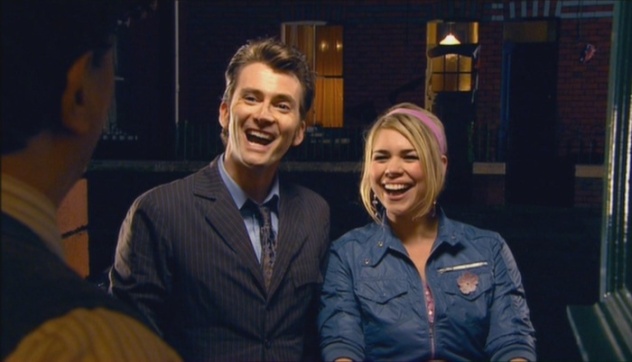
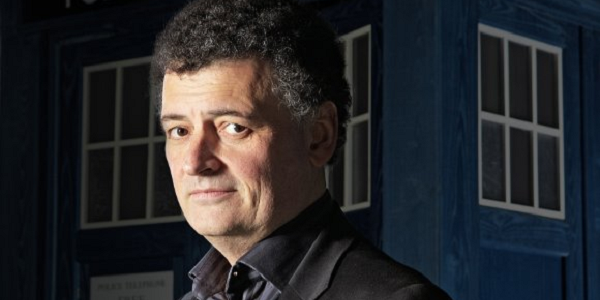
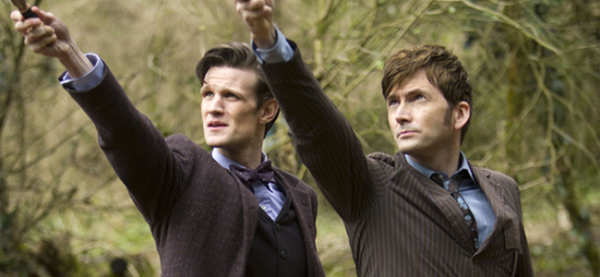
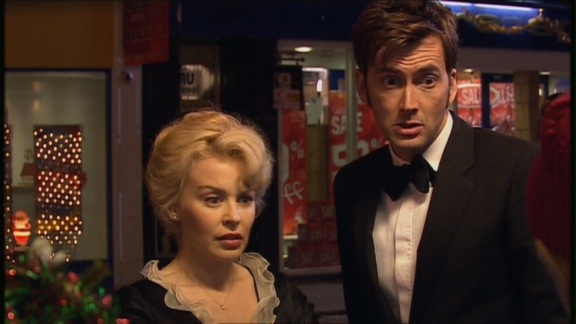
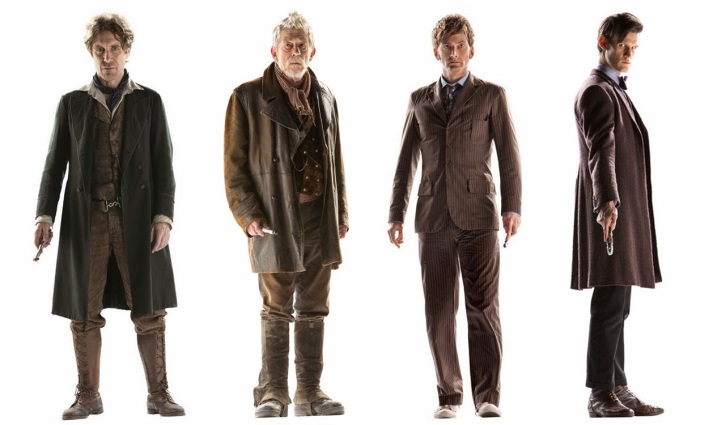
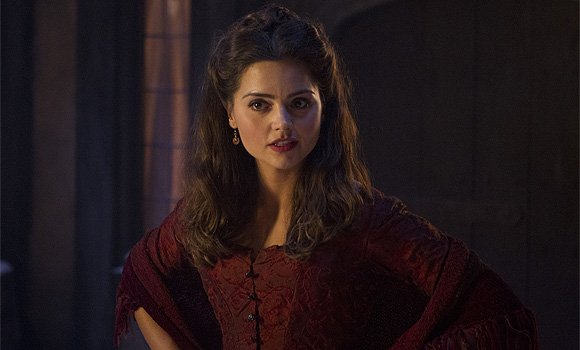
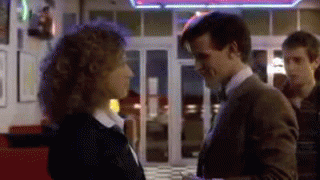
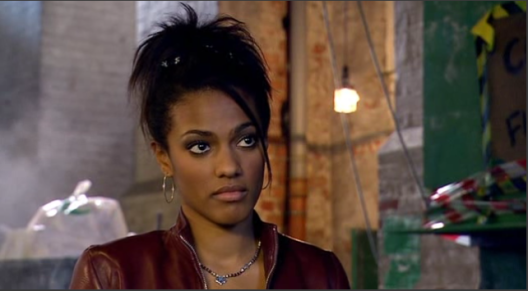
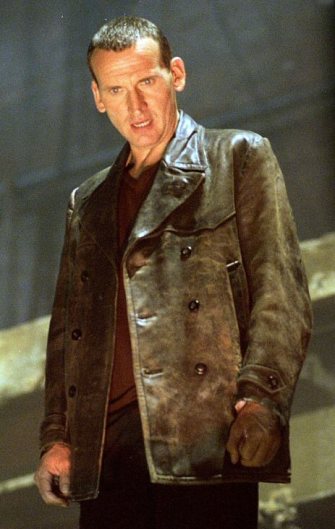
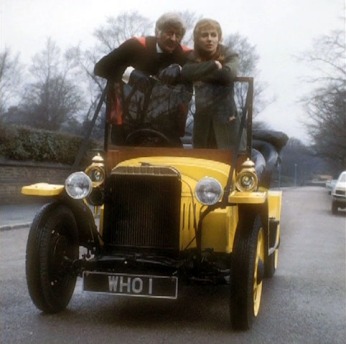
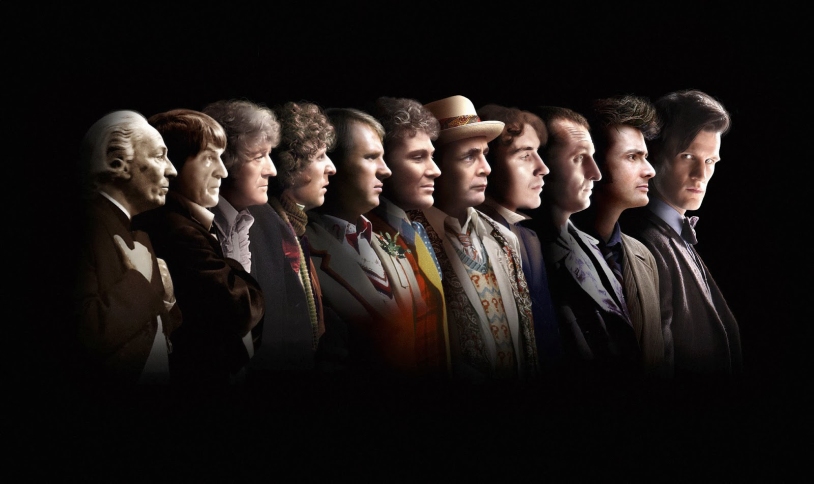
The way I see things, it’s not so much that one era is better than the other. It’s what you as a fan want from Doctor Who.
Personally speaking I didn’t start watching ‘New Who’ back in 2005 because I saw the adverts for it and thought it looked kind of cheesy, camp, childish and the production values wouldn’t stand up to other similar shows of the time (Stargate SG1!). It wasn’t until a couple of years ago that I caught an advert for Season 7 that I decided to invest my time in Doctor Who thanks to the advert’s gorgeous cinematography, on location shooting and it seemed that the Doctor was a bit of a badass with a more mature tone (my perception of Doctor Who at this time was purely based on Tom Baker and his scarf). You can watch the advert here: http://www.youtube.com/watch?v=qrEUBl2pacU
This advert hinted to me that Doctor Who was actually a visually pleasing show while being about an interesting character therefore I began right from the beginning…err, second beginning. With Christopher Eccleston.
I watched the first season and well….I didn’t think it was great but it was enjoyable enough to keep me going. The ‘Eastenders cinematography, childish stories (slitheens obviously) did put me off slightly but I was hooked by Eccleston’s doctor and the guilt he carried with him by his actions during the Time War.
You see that’s one of the biggest things I look for in television or any media I suppose. Characterisation. I know you highlighted RTD’s exploration of various allegories and that’s all well and good but it’s not something I desperately need. I don’t need to watch an episode and say “Oh I get it, it’s an Iraq war parellel!”
Characterisation is a big thing for me and when Tennant came in, all that Time War guilt seemed to go out the window just a bit in favour of turning the doctor into a super hero or in the case of ‘The Voyage of the Damned’ a Christ like figure. So I tuned out of Doctor Who a bit and was only watching purely to get through it and onto that stuff that I thought was promised to me by the advert I had seen.
Moffat’s era came along and it was just what I wanted. It looked wonderful, The Doctor seemed more fleshed out to me, same goes for his companions (well mostly Amy) and that looks to be continuing in to the Capaldi era with the question of whether the Doctor is a good man is hanging over the season. Yes Season 7 was a bit…meh but Season 5 and 6 of Doctor Who are pretty stellar for me and much better than anything RTD delivered. Because Moffat’s era gives me what I want from Doctor Who.
And just for fun…
Favourite RTD era episode: Dalek or Waters of Mars
Favourite Moffat era episode: The Girl Who Waited
LikeLike
Not standing up to the production values of SG-1 is quite embarrassing as they are in the same financial bracket and SG-1 has near double the episode count…and in terms of the Slitheen, they were annoying farting aliens but they were in a great story! Dalek is the only good Dalek episode that RTD’s era managed, the rest were appalling, and there was a lot of them. I like the Girl Who Waited but it does just seem like everything we saw in Amy’s Choice but taken to an extreme. Thematically speaking that is… And yeah Tennant, his Time War guilt was turned into a cheap gimmick to make him sound impressive and ‘Godlike’.
LikeLike